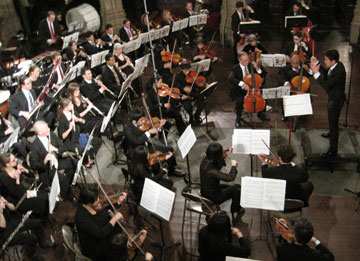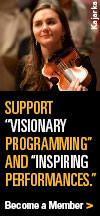March 2011
ConcertoNet: A Treat Grows in Brooklyn
by Harry Rolnick
 Sung Jin Hong may be the most ambitious conductor working today. With a more than passable orchestra of around 60, he has essayed the most difficult contemporary music (Takemitsu, Crumb etc), along with operas ranging from Mozart and Bernstein to Samuel Barber’s Vanessa. I saw two of them, Janácek’s Cunning Little Vixen and Strauss’s Ariadne, both superior productions.
Sung Jin Hong may be the most ambitious conductor working today. With a more than passable orchestra of around 60, he has essayed the most difficult contemporary music (Takemitsu, Crumb etc), along with operas ranging from Mozart and Bernstein to Samuel Barber’s Vanessa. I saw two of them, Janácek’s Cunning Little Vixen and Strauss’s Ariadne, both superior productions.
Nor was he disappointing this weekend, with no less than two Brooklyn premieres, one world premiere, and a great piece for piano soloist.
That ambition isn’t restricted to music. By placing his concerts inside Brooklyn’s most impressive religious edifice (the ponderously titled “St. Ann & Holy Trinity Episcopal Church”), he has given One World Symphony an inspiring background. Flying buttresses, a 63-foot-high ceiling, all the appurtenances of a 19th Century Gothic Revival structure are very impressive.
One caveat. For a choral concert, no site could be better. Using this church for an orchestral concert, the music is inevitably blurred. Even solo singing leads to some distortion, a feeling of “singing in the shower.”
(Note: Sunday’s concert will be at the Church of the Holy Apostles, 296 Ninth Avenue, where the sounds may be far different.)
Not that the three sopranos selected by Mr. Hong were intimidated by the massive edifice. Allison Pohl has a dramatic voice, quite fitting for the opening work, Kaija Saariaho’s Parfum de l’instant. Ms. Saariaho has shown this year what a remarkable voice-composer she is, and this was a soaring piece on a most sensuous poem by Amin Maalouf.
For the first of the Sibelius songs, The North, the voice lacked that dark Sibelius feeling, the faintly exotic-Asianic tone of the composer.
That was not to be with Gudrun Bühler, a soprano voice of notable purity, with that distant objective feeling allowing the words of the “silver mist” and “shadowy groves” to have so much feeling.
The final song, Tryst, was offered by Adriana Lee, who stood back from the audience. It was a glorious soprano, but alas, she and the orchestra were not quite in sync. (Besides it being one of Sibelius’s “salon” songs, not among his best.)
Mr. Hong orchestrated the three songs with conservative good taste. Nothing extravagant, more in line with Sibelius’s own rare orchestrations of his music.
Certainly the most ambitious piece was Finnish conductor-composer extraordinaire Esa-Pekka Salonen’s Foreign Bodies. This was the Brooklyn premiere, and perhaps the New York City premiere, since I don’t recall any previous performances. The work was recorded by the composer with the Finnish Radio Symphony Orchestra with instruments as dazzling and sure as the music itself.
One World Symphony was surprisingly good for such a difficult, non-stop whirling piece. The sounds in the church precluded the quasar-sharp points of lights which had to be emitted, but the relative smallness of the One World orchestra gave it inevitably a transparency for which any orchestra would be proud.
Nothing could contrast more with Salonen’s music than Grieg’s Piano Concerto. The first was a deconstruction of notes and movements, the latter a perfectly linear — and somewhat welcome — warhorse which still rides well.
I had never heard Chrisotpher Johnson before, but he is exciting to watch. (Head thrown back, arms raised in triumph, he makes Lang Lang resemble a stone!). He made the Grieg sing, has a terrific technique, and, along with conductor Hong, obviously enjoyed the opportunity of giving unallowed joy in the church.





